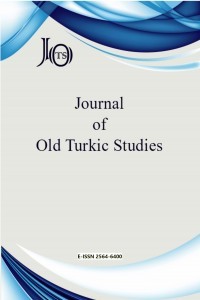Ares: Türk Kökenli Bir Yunan Tanrısı
The naming Ares, which is the god of war in Greek Mythology and seems to be of the Scythian, occurs in the work of Homeros before the Scythians arrived in the Eastern Europea. This fact confirms that the mentioned word belongs to the language of an indigeneous Scythian community. In this paper, the present-day remnants and equivalents of the Scythian word in Turkic and Slavic languages will be shown.
Ares: A Greek God of Turkic Origin
The naming Ares, which is the god of war in Greek Mythology and seems to be of the Scythian, occurs in the work of Homeros before the Scythians arrived in the Eastern Europea. This fact confirms that the mentioned word belongs to the language of an indigeneous Scythian community. In this paper, the present-day remnants and equivalents of the Scythian word in Turkic and Slavic languages will be shown.
___
- Auty, R. (1965). Handbook of Old Church Slavonic II: Texts and Glosssary. London: The Athlone Press.
- Bayat, F., & Aliyeva, M. E. (2008). Eski Türkçe Sözlük. İstanbul: Yalın Yayıncılık.
- Beekes, R. (2010). Etymological Dictionary of Greek. Leiden-Boston: Brill.
- Blockley, R. (1983). The Fragmentary Classicising Historians of the Later Roman Empire: Eunapius, Olympiodorus, Priscus and Malchus II: Text, Translation and Historiographical Notes. Liverpool: Francis Cairns.
- Çankaya, S. (2014). Kırgız Sözlüğü/Kırgızca-Türkçe. İstanbul: Bilge Kültür Sanat.
- Dybo, A. (2007). Lingvisticheskiye Kontakty Pannikh Tyurkov. Leksicheskiy fond., Pratyurkskiy Period. Moskva: Vostochnaya literatura.
- Goffart, W. (1988). The Narrators of Barbarian History (A.D. 550-800) Jordanes, Gregory of Tours, Bede and Paul the Deacon. New Jersey: Princeton University Press.
- Herodotos. (2004). Herodot Tarihi. İstanbul: Türkiye İş Bankası.
- Hesiodos. (1977). Hesiodos Eseri ve Kaynakları. Ankara: Tük Tarih Kurumu Basımevi.
- Hirth, F. (1908). The Ancient History of China. New York: Colombia University Press.
- Homeros. (2004). İlyada. Ankara: Arkadaş Yayınevi.
- Iordan. (2001). O Proiskhozhdenii i Deyaniyakh Getov (Getica). St. Petersburg: Aleteyya.
- Kamensky, V. M. (1991). Churchslavonic-Russian-English Dictionary (Russian and English Edition). South Canaan: St. Tikhon’s Seminary Press.
- Klein, E. (1971). Etymological Dictionary of the English Language. London&New York: Elsevier.
- Loades, M. (2019). War Bows: Longbow, Crossbow, Composite Bow and Japanese Yumi. Oxford: Osprey Publishing.
- Millington, A. T. (2013). Iyarri at the Interface: The Origins of Ares. In Mouton, A. et al. (Eds), Luwian Identities: Culture, Language and Religion Between Anatolia and the Aegean (pp. 543-565). Leiden&Boston: Brill.
- Naskali, E. G., & Duranlı, M. (1999). Altayca-Türkçe Sözlük. Ankara: Türk Dil Kurumu Yayınları.
- Özşahin, M. (2017). Başkurt Türkçesi Sözlüğü. Ankara: Türk Dil Kurumu.
- Ssu-ma Ch'ien. (2011). The Grand Scribe’s Records, the Volume IX, the Memoirs of Han China, Part II. Bloomington and Indianapolis: Indiana University Press.
- Starostin, S. A., et al. (2003). An Etymological Dictionary of Altaic Languages II. Leiden: Brill.
- Şengül, F. (2013). Sabir Sekel Avar ve Bulgar Etnik Meselelerinin Çözümü. İstanbul: Hikmetevi Yayınları.
- Şengül, F. (2020). The Language of the Farmer Scythians. The Journal of International Society of Language and Literature, 46: 31-62.
- Taskina, V. (1973). Materialy po Istorii Syunnu (po Kitayskim Istochnikam II). Moskva: Nauka.
- Türkiye’de Halk Ağzından Derleme Sözlüğü (1993). 12 Cilt, II. Baskı, Ankara: Türk Dil Kurumu Yayınları. (→ DS)
- Weekley, E. (1961). An Etymological Dictionary of Modern English. Cambridge: Cambridge University.
- Yudahin, K. (1998). Kırgız Sözlüğü II. Ankara: Türk Dil Kurumu Yayınları.
- Yayın Aralığı: Yılda 2 Sayı
- Başlangıç: 2017
- Yayıncı: Erdem UÇAR
